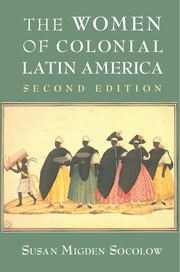Book contents
- Frontmatter
- Dedication
- Contents
- List of Figures
- Acknowledgments
- Introduction: Why Women?
- Chapter One Iberian Women in the Old World and the New
- Chapter Two Before Columbus: Women in Indigenous America and Africa
- Chapter Three Conquest and Colonization
- Chapter Four The Arrival of Iberian Women
- Chapter Five Women, Marriage, and Family
- Chapter Six Elite Women
- Chapter Seven The Brides of Christ and Other Religious Women
- Chapter Eight Women and Work
- Chapter Nine Women and Slavery
- Chapter Ten Women and Social Deviance
- Chapter Eleven Women and Enlightenment Reform
- Conclusion
- Documents
- Suggested Further Reading
- Index
- Plate section
Conclusion
Published online by Cambridge University Press: 05 February 2015
- Frontmatter
- Dedication
- Contents
- List of Figures
- Acknowledgments
- Introduction: Why Women?
- Chapter One Iberian Women in the Old World and the New
- Chapter Two Before Columbus: Women in Indigenous America and Africa
- Chapter Three Conquest and Colonization
- Chapter Four The Arrival of Iberian Women
- Chapter Five Women, Marriage, and Family
- Chapter Six Elite Women
- Chapter Seven The Brides of Christ and Other Religious Women
- Chapter Eight Women and Work
- Chapter Nine Women and Slavery
- Chapter Ten Women and Social Deviance
- Chapter Eleven Women and Enlightenment Reform
- Conclusion
- Documents
- Suggested Further Reading
- Index
- Plate section
Summary
The role of women in colonial Latin American society was markedly different than that of men. Men were supposed to be intelligent, active, and independent; women were usually portrayed as silly, passive, dependent creatures. Men were charged with protecting their family’s honor and fortune whereas women could endanger them through sexual misbehavior. Men could freely come and go, but women’s physical movement was closely scrutinized. In other words, gender mattered.
Colonial Latin American women lived in a patriarchal society, a world in which men occupied positions of authority and power. In general men had rights over women that they did not have over other men, and women did not have over themselves. Men also defined acceptable female conduct, and controlled the justice system, which punished those who overstepped the established boundaries of acceptable behavior. But even here there was always some room for negotiation, and for protecting a woman who had failed to adhere to the rules of the game. The culture of patriarchy was never as absolute in reality as it was in theory.
Race and class also mattered, both in determining what was expected from any woman and in defi ning the possible roles open to her. The parameters of acceptable female conduct and activities were closely tied to her social class and racial category. Elite white women were to be chaste and under the direct supervision of their male kin. In theory these women, prized for their purity, were to be protected, cloistered, chaperoned, and never left alone in the company of men who were not their close kin. White women, both those of the elite and those who aspired to join its ranks, were usually under great social pressure to conform to the stereotype of female passivity and dependence.
- Type
- Chapter
- Information
- The Women of Colonial Latin America , pp. 190 - 192Publisher: Cambridge University PressPrint publication year: 2015

